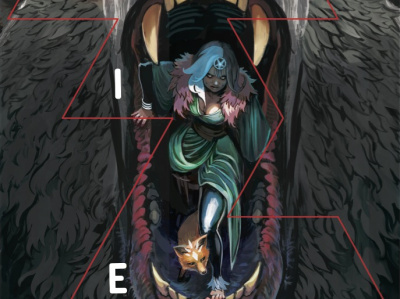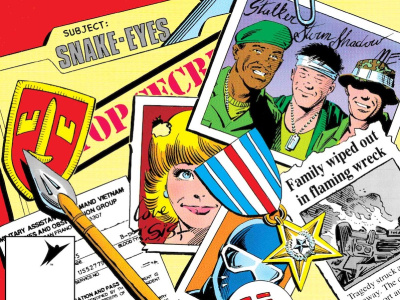James Kite of Serenity Studios read Ryan Dancey's commentary regarding copyrights (see "Ryan Dancey on Pirates and Copyrights") and writes in with his own thoughts:
Copyright was originally (though this may change from country to country) something like seven years or so to provide artists/composers revenue for their creative talents (and encourage such talents to flourish) when previously the artist had to rely on a patron to survive while creating. Over time, this period was extended to cover the life of the artist/author/etc. (by way of the Berne Convention) and varied from country to country though through common agreement a unity was reached though it wasn't until recently that the USA became a part of this common agreement (previously having preferred to maintain it's own version of copyright law over that of others though still a signatory to the UCC, like the Soviet Union).
With ownership of brands propping up companies, copyright was been extended to well beyond that of the creators life, specifically due to companies such as Disney. Every time Mickey Mouse comes up for loss of Copyright, copyright is typically extended. If Mickey Mouse was to fall into the public domain then Disney would not only lose significant branding recognition, but every company involved with the sale and promotion of such material would be affected (from distributors all the way down to the local comicshop/newsagent) as would the perceived value of the brand to collectors (whether the hard core purist or the common person on the street who simply grew up with Mickey).
For the successful artist like Giger, who may have a continuing stream of revenue long after the initial release of a creation, to lose that revenue could adversely affect their existing business strategies that may help promote tourism (Giger's museum for example) and could in turn lead them to alter how they may otherwise distribute their work (for example, rather than release a calendar every year, creating a source of revenue that helps many businesses, to restricting the release of artwork to patrons who can afford the prices that may be attached with a proviso not to allow the reproduction of the artwork that would be then be for personal display only restricting the enjoyment of the creators work to a select few, rather than the masses).
Webcomic artists have broken into a new stream of revenue by way of the old Patron system to build a fanbase and in turn allowing them the opportunity to move into the more corporate realm of earning money. But how successful would they be if others could then go ahead and begin using their creations for free (and without permission), potentially just as they establish themselves (while some gain success seemingly over night, others spend years beating a seemingly dead horse). How many webcomic artists would be inclined to attempt to re-invent the wheel once successful? Something that may need to be considered if others create far superior derivatives of their characters.
Not to mention where the likes of Marvel, DC, Dark Horse, etc. would be if they were to lose control of their major characters. Kenzer & Co. if I recall correctly has just reached 20 years with the Knights of the Dinner Table characters and to be blunt, that is their prize horse in their stable that fuels their continued existence as they expand on their business plan. The last thing they need is to have that gem plucked from them (they might survive if the rest of their stable is decent. But with each year looming, more and more intelectual property would fall by the wayside, still usable by the original creator/owner, but with ever greater loss of Brand recognition).
And then of course for the unsuccessful artist who has yet to find their niche in the field and is still struggling to obtain any form of revenue from their creations. If only one item proves successful but a year or two later it is snatched away from you after it strikes a cord with the masses while your working to recreate that success... then what is the point?
All in all, who wants to constantly be trying to create the next big thing when it's hard enough to maintain what you have achieved or are attempting to achieve.
As previously mentioned, upon the death of the creator, their heirs in turn maintain a lifestyle that they may not otherwise be able to have (should they be so lucky). The decision to release a property into the public domain should be one made by the existing owner of the property (or should such "ever" reach the currently accepted limitations should such limitations not be extended).
While one can make the argument that copyright should follow the U.S. Constitution there is a slight problem. Copyright law is far more international and the USA is a part of these agreements so any examination of the U.S. Constitution as the sole basis for copyright would run the risk of weakening any value to copyright for the USA (for example, the USA only recently (1989) signed onto the Berne convention).
"The United States only provided copyright protection for a fixed, renewable term, and required that in order for a work to be copyrighted it must contain a copyright notice and be registered at the Copyright Office. The Berne Convention, on the other hand, provided for copyright protection for a single term based on the life of the author, and did not require registration or the inclusion of a copyright notice for copyright to exist. Thus the United States would have to make several major modifications to its copyright law in order to become a party to it. At the time the United States was unwilling to do so. The UCC thus permits those states which had a system of protection similar to the United States for fixed terms at the time of signature to retain them. Eventually the United States became willing to participate in the Berne convention, and change its national copyright law as required." (from Wikipedia)
There are several Copyright agreements in affect (the Berne Convention originated late 1800s) designed to protect the interests of residents of specific countries from unwarranted usage of their properties by others located outside their country. For a country to remove themselves from an agreement by introducing copyright laws less than that required would in turn place that countries economic enjoyment of such protections at risk as other countries who are still party to such an agreement would no longer be required to defend said countries interests in such agreements unless they are in turn a party to a copyright agreement that country was also a party to, though of a lesser value in such protections.
In short, unless there is a universal change (by way of every country signing onto a weaker agreement), any change to a lesser protection weakens any protection a country would have on a global scale. And considering the state of the global economy, any such occurrence can only be a bad one that runs the risk of undermining the countries ability to ride out such a crisis as the world currently faces.
Copyright, trademark and patent law is not a simple area and many assume certain facts with little knowledge about the reality of what is in place.
The better approach is not to seek to remove the rights of others against their will (otherwise what other rights will you be open to the removal of?) but to encourage others through logic that taking a specific course of action is in their best interests (rather than how it will benefit you specifically if they lose their rights).
The opinions expressed in this article are solely those of the writer, and do not necessarily reflect the views of the editorial staff of ICv2.com.
'Not A Simple Area'
Posted by ICv2 on June 21, 2009 @ 11:00 pm CT
MORE TALK BACK
'How Would You Deal with This?'
April 15, 2024
Ralph DiBernardo of Jetpack Comics shares his frustrations on street release dates being ignored and the lack of consequences.
'We Need More Long-Term Thinking.'
November 30, 2023
In this Talk Back, Allen Berrebbi, Director of Business Development for Big Bang Comics, comments on the current state of the Direct Market and offers a couple of suggestions to help save it.
MORE COMICS
New 'Die' Story Out in November, Alongside 'Die Quickstart RPG Guide'
August 11, 2025
The Die: Loaded #1 will be released in November 2025, the same month as The Die RPG Quickstart Game Guide.
'Hama Files Editions' Will Include a Letter from the Creator
August 11, 2025
Each issue of the Hama Files Editions will include a letter from Hama with background information about the comic.







